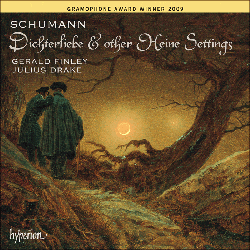Dichterliebe & other Heine Settings
Dichterliebe & other Heine Settings
2008 | Hyperion
Gerald Finley (baritone)
About
Why another Dichterliebe recording? Because Gerald Finley has simply one of the greatest voices of his generation, and is an artist at the peak of his powers. He brings to this noble song cycle the supreme technical ability and penetrating musical understanding that characterize all his performances, whether on the concert platform, in the recording studio or on the great opera stages of the world. This is his fourth disc with collaborator Julius Drake, and the partnership has proved to be a uniquely rewarding one.
This fine recital also includes many of Schumann’s other Heine settings. The extremes of elation and despair in Heine’s poetry stimulated Schumann to write some of his most poignant and unforgettable songs. This is truly a disc to treasure.
Track Listing
Schumann: Romanzen Und Balladen 4, Op. 64 – 3A. Tragödie 1
Schumann: Romanzen Und Balladen 4, Op. 64 – 3B. Tragödie 2
Schumann: Romanzen Und Balladen 2, Op. 49 – 1. Die Beiden Grenadiere
Schumann: Romanzen Und Balladen 1, Op. 45 – 3. Abends Am Strand
Schumann: Romanzen Und Balladen 2, Op. 49 – 2. Die Feindlichen Brüder
Schumann: Romanzen Und Balladen 3, Op. 53 – 3A. Der Arme Peter 1
Schumann: Romanzen Und Balladen 3, Op. 53 – 3B. Der Arme Peter 2
Schumann: Romanzen Und Balladen 3, Op. 53 – 3C. Der Arme Peter 3
Schumann: Belsatzar, Op. 57
Schumann: Myrthen, Op. 25 – 7. Die Lotosblume
Schumann: Myrthen, Op. 25 – 21. Was Will Die Einsame Träne?
Schumann: Myrthen, Op. 25 – 26. Du Bist Wie Eine Blume
Schumann: Vier Gesänge, Op. 142 – 2. Lehn’ Deine Wang’ An Meine Wang
Schumann: Fünf Lieder Und Gesänge, Op. 127 – 3. Es Leuchtet Meine Liebe
Schumann: Fünf Lieder Und Gesänge, Op. 127 – 2. Dein Angesicht So Lieb Und Schön
Schumann: Vier Gesänge, Op. 142 – 4. Mein Wagen Rollet Langsam
Schumann: Dichterliebe, Op. 48 – 1. Im Wunderschönen Monat Mai
Schumann: Dichterliebe, Op. 48 – 2. Aus Meinen Tränen Spriessen
Schumann: Dichterliebe, Op. 48 – 3. Die Rose, Die Lilie, Die Taube, Die Sonne
Schumann: Dichterliebe, Op. 48 – 4. Wenn Ich In Deine Augen Seh’
Schumann: Dichterliebe, Op. 48 – 5. Ich Will Meine Seele Tauchen
Schumann: Dichterliebe, Op. 48 – 6. Im Rhein, Im Heiligen Strome
Schumann: Dichterliebe, Op. 48 – 7. Ich Grolle Nicht
Schumann: Dichterliebe, Op. 48 – 8. Und Wüssten’s Die Blumen, Die Kleinen
Schumann: Dichterliebe, Op. 48 – 9. Das Ist Ein Flöten Und Geigen
Schumann: Dichterliebe, Op. 48 – 10. Hör’ Ich Das Liedchen Klingen
Schumann: Dichterliebe, Op. 48 – 11. Ein Jüngling Liebt Ein Mädchen
Schumann: Dichterliebe, Op. 48 – 12. Am Leuchtenden Sommermorgen
Schumann: Dichterliebe, Op. 48 – 13. Ich Hab’ Im Traum Geweinet
Schumann: Dichterliebe, Op. 48 – 14. Allnächtlich Im Traume
Schumann: Dichterliebe, Op. 48 – 15. Aus Alten Märchen
Schumann: Dichterliebe, Op. 48 – 16. Die Alten, Bösen Lieder
